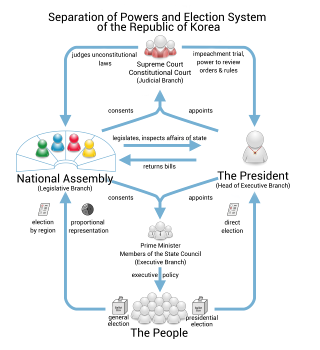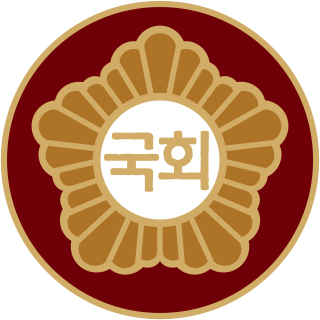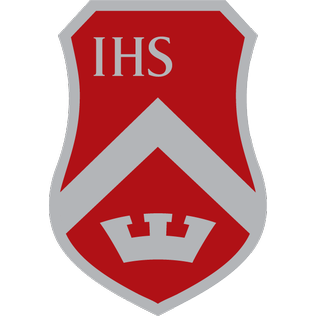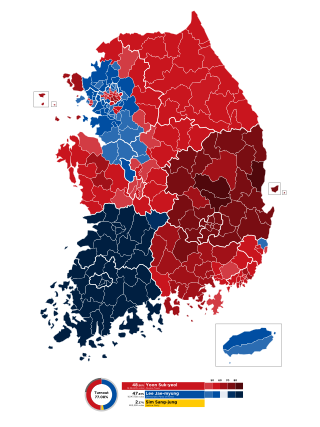This article relies largely or entirely on a single source .(July 2022) |
The members of the seventh National Assembly of South Korea were elected on 8 June 1967. The assembly sat from 1 July 1967 until 30 June 1971. [1]
This article relies largely or entirely on a single source .(July 2022) |
The members of the seventh National Assembly of South Korea were elected on 8 June 1967. The assembly sat from 1 July 1967 until 30 June 1971. [1]
| Date | Constituency | Incumbent | Party | New member | Party | Notes | ||
|---|---|---|---|---|---|---|---|---|
| 19 July 1967 | Proportional representation | Kim Do-yeon | New Democratic | Kim Hyeon-gi | New Democratic | Incumbent died on 19 July 1967; replaced by the next member in the New Democratic list. | ||
| 27 February 1968 | Proportional representation | Choi Yeong-hui | Democratic Republican | Hyeon Jeong-ju | Democratic Republican | Incumbent resigned on 27 February 1968 upon appointment as Minister of National Defense; replaced by the next member in the Democratic Republican list. | ||
| 3 June 1968 | Seocheon–Boryeong, South Chungcheong Province | Lee Won-jang | Democratic Republican | Kim Ok-seon | New Democratic | Incumbent's election invalidated on 3 June 1968 after a recount. Runner-up declared as the winner in the 1967 election. | ||
| 24 September 1968 | Buyeo, South Chungcheong Province | Kim Jong-pil | Democratic Republican | Kim Jong-ik | Democratic Republican | Incumbent resigned on 2 June 1968. New member by-elected. | ||
| Gochang, North Jeolla Province | Sin Yong-nam | Democratic Republican | Sin Yong-nam | Democratic Republican | Incumbent resigned on 4 July 1967; re-elected in the by-election. | |||
| Hwasun–Gokseong, South Jeolla Province | Gi Se-pung | Democratic Republican | Yang Hoe-su | New Democratic | Incumbent resigned on 5 July 1967. New member by-elected. | |||
| 28 February 1969 | Naju, South Jeolla Province | Lee Ho-beom | Democratic Republican | Lee Ho-beom | Democratic Republican | Incumbent's election invalidated on 11 December 1968; re-elected in the by-election. | ||
| 14 May 1969 | Proportional representation | Kim Gyu-nam | Democratic Republican | Kim Yong-chae | Democratic Republican | Incumbent resigned on 14 May 1969; replaced by the next member in the Democratic Republican list.. | ||
| 14 August 1969 | Boseong, South Jeolla Province | Yang Dal-seung | Democratic Republican | Lee Jung-jae | New Democratic | Incumbent's election invalidated on 25 July 1969. New member by-elected. | ||
| 25 August 1969 | Jinhae–Changwon, South Gyeongsang Province | Jo Chang-dae | New Democratic | Seat remained vacant | Incumbent died on 25 August 1969. No by-election held. | |||
| 7 September 1969 | Proportional representation | Yeon Ju-heum | New Democratic | Seat remained vacant | Incumbent resigned on 7 September 1969. | |||
| Proportional representation | Jo Heung-man | New Democratic | Seat remained vacant | Incumbent resigned on 7 September 1969. | ||||
| 5 December 1969 | Changnyeong, South Gyeongsang Province | Seong Nak-hyeon | New Democratic | Seong Nak-hyeon | New Democratic | Incumbent resigned on 7 September 1969; re-elected in the by-election. | ||
| 22 May 1970 | Chungmu–Tongyeong–Goseong, South Gyeongsang Province | Choi Seok-rim | Democratic Republican | Choi Seok-rim | Democratic Republican | Incumbent's election invalidated on 1 May 1970; re-elected in the by-election. | ||
| 11 June 1970 | Proportional representation | Hyeon Jeong-ju | Democratic Republican | Seat remained vacant | Incumbent died on 11 June 1970. | |||
| 29 June 1970 | Proportional representation | Kim Se-yeong | New Democratic | Seat remained vacant | Incumbent resigned on 29 June 1970. | |||
| 28 December 1970 | Yesan, South Chungcheong Province | Park Byeong-seon | Democratic Republican | Seat remained vacant | Incumbent's election invalidated on 28 December 1970. No by-election held. | |||
| 11 January 1971 | Seongdong A, Seoul | Jo Han-baek | New Democratic | Seat remained vacant | Incumbent resigned on 11 January 1971. No by-election held. | |||
| 19 January 1971 | Gwangsan, South Jeolla Province | Park Jong-tae | Democratic Republican | Seat remained vacant | Incumbent resigned on 19 January 1971. No by-election held. | |||
| 8 February 1971 | Proportional representation | Lee Jae-hyeong | New Democratic | Seat remained vacant | Incumbent resigned on 8 February 1971. | |||
| 16 February 1971 | Chungmu–Tongyeong–Goseong, South Gyeongsang Province | Choi Seok-rim | Democratic Republican | Seat remained vacant | Incumbent resigned on 16 February 1971. No by-election held. | |||
| 8 March 1971 | Chuncheon–Chunseong, Gangwon Province | Kim U-yeong | Democratic Republican | Seat remained vacant | Incumbent resigned on 8 March 1971. No by-election held. | |||
| 15 March 1971 | Dong, Busan | Park Gi-chul | New Democratic | Seat remained vacant | Incumbent resigned on 15 March 1971. No by-election held. | |||
| 19 March 1971 | Uijeongbu–Yangju, Gyeonggi Province | Lee Jin-yong | Democratic Republican | Seat remained vacant | Incumbent resigned on 19 March 1971. No by-election held. | |||
| 23 April 1971 | Yeosu–Yeocheon, South Jeolla Province | Lee U-heon | Democratic Republican | Seat remained vacant | Incumbent resigned on 23 April 1971. No by-election held. | |||
| 3 May 1971 | Gurye–Gwangyang, South Jeolla Province | Lee Hyeon-jae | Democratic Republican | Seat remained vacant | Incumbent resigned on 3 May 1971. No by-election held. | |||
| 5 May 1971 | Masan, South Gyeongsang Province | Han Tae-il | Democratic Republican | Seat remained vacant | Incumbent resigned on 5 May 1971. No by-election held. | |||

The International Astronomical Union is a non-governmental organisation with the objective of advancing astronomy in all aspects, including promoting astronomical research, outreach, education, and development through global cooperation. It was founded in 1919 and is based in Paris, France.

The history of South Korea begins with the Japanese surrender on 2 September 1945. At that time, South Korea and North Korea were divided, despite being the same people and on the same peninsula. In 1950, the Korean War broke out. North Korea overran South Korea until US-lead UN forces intervened. At the end of the war in 1953, the border between South and North remained largely similar. Tensions between the two sides continued. South Korea alternated between dictatorship and liberal democracy. It underwent substantial economic development.

The politics of South Korea take place in the framework of a presidential representative democratic republic, whereby the president is the head of state, and of a multi-party system. To ensure a separation of powers, the Republic of Korea Government is made up of three branches: legislative, executive, and judicial. The government exercises executive power and legislative power is vested in both the government and the National Assembly. The judiciary is independent of the executive and the legislature and comprises a Supreme Court, appellate courts, and a Constitutional Court.

The president of the Republic of Korea, also known as the president of South Korea (Korean: 대통령), is the head of state and head of government of the Republic of Korea. The president leads the State Council, and is the chief of the executive branch of the national government as well as the commander-in-chief of the Republic of Korea Armed Forces.
The Liberty Korea Party (Korean: 자유한국당) was a conservative political party in South Korea that was described variously as right-wing, right-wing populist, or far-right. Until February 2017, it was known as the Saenuri Party, and before that as the Hannara Party from 1997 to 2012, both of which are still colloquially used to refer to the party. The party formerly held a plurality of seats in the 20th Assembly before its ruling status was transferred to the Democratic Party of Korea on 27 December 2016, following the creation of the splinter Bareun Party by former Saenuri members who distanced themselves from President Park Geun-hye in the 2016 South Korean political scandal.

The National Assembly of the Republic of Korea, often shortened to the National Assembly, is the unicameral national legislature of South Korea. Elections to the National Assembly are held every four years. The latest legislative elections was held on 10 April 2024. The National Assembly has 300 seats, with 253 constituency seats and 47 proportional representation seats; 30 of the PR seats are assigned an additional member system, while 17 PR seats use the parallel voting method.

Kim Jong-pil, also known colloquially as JP, was a South Korean politician and the founder/first director of the Korean Central Intelligence Agency. He served as Prime Minister twice, from 1971 to 1975 during the presidency of Park Chung Hee (1961–1979) and from 1998 to 2000 during the presidency of Kim Dae-jung (1998–2003). He was a nine-term National Assembly member.

The prime minister of the Republic of Korea is the deputy head of government and the second highest political office of South Korea who is appointed by the President of the Republic of Korea, with the National Assembly's approval. The prime minister may be a member of the National Assembly, but this is not required to hold the office. The prime minister of South Korea is not the head of government of South Korea, for the President is both the head of state and government in the country.
Elections in South Korea are held on a national level to select the President and the National Assembly. Local elections are held every four years to elect governors, metropolitan mayors, municipal mayors, and provincial and municipal legislatures.

Elections in North Korea are held every four-to-five years for the Supreme People's Assembly (SPA), the country's national legislature, and every four years for Local People's Assemblies. Critics argue that North Korean elections lack competition and allow the government to claim legitimacy. According to official reports, turnout is near 100%.

The Third Republic of South Korea was the government of South Korea from December 1963 to November 1972. The Third Republic was founded on the dissolution of the Supreme Council for National Reconstruction that overthrew the Second Republic and established a military government in May 1961. Park Chung Hee, the Chairman of the Supreme Council, was elected President of South Korea in the 1963 presidential election.

Sogang University is a private research university in Seoul, South Korea. It was established in 1960 by Fr. Theodore Geppert, SJ with the Wisconsin Province of the Society of Jesus with the school being the oldest Jesuit institution of higher education in the country.

Choe Yong-gon was the Supreme Commander of the Korean People's Army from 1948 to 1950, North Korean defence minister from 1948 to 1957, and the Chairman of the Standing Committee of the Supreme People's Assembly of the Democratic People's Republic of Korea from 1957 to 1972.

Lieutenant General Henry Doctor Jr. was the Commanding General, 2nd Infantry Division, Eighth United States Army, based in South Korea. His last assignment was as The Inspector General of the U.S. Army.

The New Democratic Party was a South Korean opposition party that existed from 1967 to 1980, when it was forcibly dissolved by the ninth amendment of the constitution promulgated by Chun Doo-hwan the same year. It was the main opposition party during the Park Chung-hee dictatorial regime, and especially since 1972, when the Yushin constitution was put into effect.

The Democratic Party of Korea, formerly known as the New Politics Alliance for Democracy, is a centrist-liberal South Korean political party. The DPK and its rival, the People Power Party (PPP), form the two major political parties of South Korea.

Legislative elections were held in South Korea on 15 April 2020. All 300 members of the National Assembly were elected, 253 from first-past-the-post constituencies and 47 from proportional party lists. They were the first elections held under a new electoral system. The two largest parties, the liberal Democratic Party and the conservative United Future Party, set up new satellite parties to take advantage of the revised electoral system. The reforms also lowered the voting age from 19 to 18.
Legislative elections in South Korea determine the composition of the National Assembly for the next four years.

Presidential elections were held in South Korea on 9 March 2022. Under the South Korean constitution, presidents are restricted to a single five-year term, meaning that incumbent president Moon Jae-in was ineligible to run for a second term. Opposition candidate Yoon Suk Yeol of the People Power Party won the election, defeating candidate Lee Jae-myung of the incumbent Democratic Party.